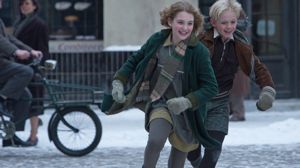It's said that the Inuit have over fifty different words for snow. As a Canadian, I've probably experienced all of them. This puts you and your work at a serious disadvantage. Film fans like me who live in a Northern climate know fake snow when we see it.
We also have a complicated relationship with the white wonder. Kids eagerly anticipate the first snowfall, dreaming of school closures. Adults slog to work in the half-snow/half-rain slop that always manages to trickle an icy path down the back of your neck regardless of how well you bundle up. The same distinction can be made with World War II movies. Some hit you like an avalanche and some just leave you soggy and disappointed. The Book Thief lives on that slippery slope in between.
The Book Thief follows Liesel (the innately talented Sophie Nelisse), a young illiterate girl taken from her Communist mother and delivered to childless couple, Hans (Geoffrey Rush) and Rosa (Emily Watson) somewhere in Germany. Immediately upon taking up residence in her new home, Liesel meets love-struck Rudy (Nico Liersch), the literal boy next door, who becomes her best friend. Hans, a sign-painter, teaches Liesel how to read and paints a dictionary for her in the basement so she can hone her reading skills. As the tense situation for Jews in Germany escalates, a young man named Max (Ben Schnetzer) shows up on Hans and Rosa's doorstep and they offer to shelter him in their basement. When Max becomes ill, Liesel, now an avid reader, steals books to read to Max as he convalesces. It is here, in the darkest days of the war, that Liesel clings to humanity through the wonder of storytelling.
The film spans several years, and you sprinkle the sets with snow to denote the passage of time. Opening with a sweeping shot of a train racing on snow-covered tracks, a title card reads 'Germany, February 1938'. This kind of vagueness sets up a film that brushes past details in favour of a broad-strokes Nazi movie for the whole family. The film is narrated by Death himself, a harsh tactic for younger audiences made palatable by the disembodied voice's cross between Marvin the Paranoid Android and Ringo Starr's Thomas the Tank Engine. Hans and Rosa, on the other hand, are from the Anne of Green Gables School of Adoptive Parents - a Teutonic Matthew and Marilla - he, the kind-hearted pushover, she the frosty task-master with a soft, marzipan center. When Liesel and Rudy race through the streets of their painfully obvious movie-set town, it's meant to allude to their disappearing innocence and ends with them skidding into your carefully piled mound of ersatz slush. It's not a fluffy snowbank, but an icy impediment to their freedom. Only children and simple-minded adults won't find these tropes as subtle as a snowball to the face.
If you look at a snowbank in the middle of winter you will see striations - layer upon layer of snow as it's fallen and settled. Layering detail could have benefited both character and story development here. Liesel runs along your snowy riverbank after Rudy has jumped into the icy waters to retrieve her book and then they both walk home normally - no shivering, no chattering teeth, no visible breath. The characters speak in English with German accents and sometimes (inexplicably) switch over to German with subtitles, a conceit that sticks out as sorely as Spielberg's Girl in the Red Coat. We also don't know what Liesel and her mother's relationship was like, what Hans and Rosa's backstories are, or how Max came to knock on their door - omissions that will surely perturb fans of The Book Thief novel.
This film is at its best when it strives for_ Empire of the Sun_ and Hope and Glory levels of World War II coming-of-age realism. There's the moment where Hans tearfully admonishes himself for trying to keep a Jewish neighbour from being carted off knowing that for his trouble he might be next. Or when Liesel befriends the Beurgmeister's wife who has lost a son in the war and her fondness for the young girl is tinged with sorrow. Sadly, such moments are few and far between.
A highlight for you must have been the scene involving Liesel and Hans carting buckets of snow to the basement for Max, who has been confined indoors for months. They find a few moments of fun together throwing snowballs and building a snowman, with even the dour Rosa joining in. Your snow is used to remind this surrogate family what normal is, and it's one of the film's most poignant scenes.
But in the end, _The Book Thief _too badly wants to deliver a little something for everyone. It's a lofty motivation that unfortunately ends up like one your slush-filled puddles; murky, shallow and soggy.
Stay warm,
Di







